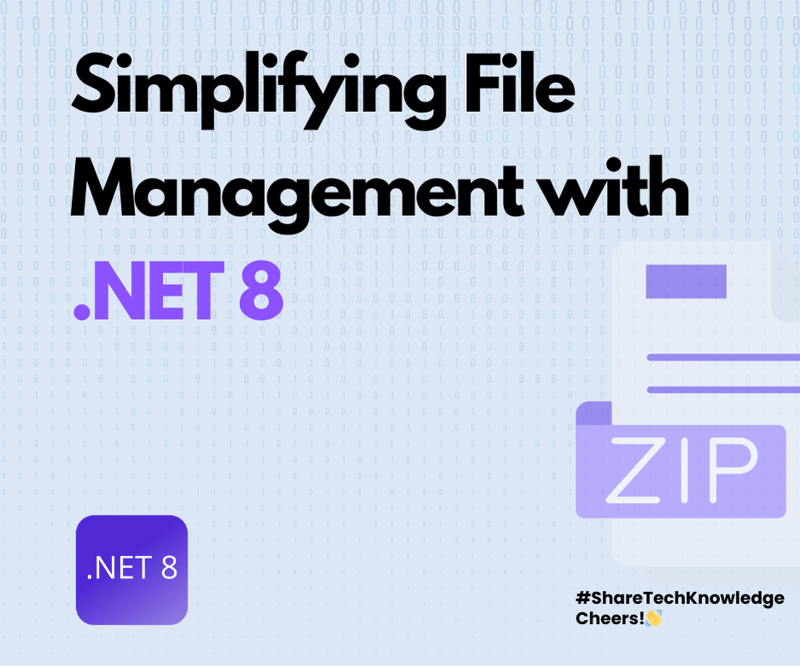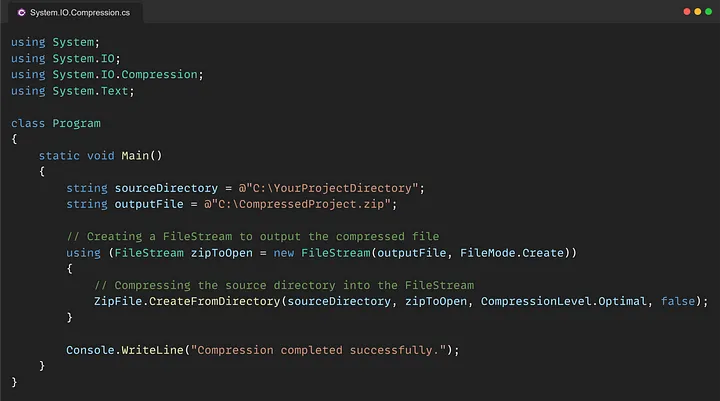Data management has become a must not only of digital contents generation process, but also of a wide range of other business processes, which are based on data ever increasing flow. Compression methods take up the lead in this struggle, which offers a way through which free disk space can be saved and the data transfer speeds improved.
The latest innovation in .NET 8 C# particularly in the System.IO.Compression namespace gives more powerful arsenal to the developers. Now they can compress files from folders to streams without having to use disk storage intermediate. We will show these improvements, and there is the practical illustration to help in particular circumstances which one may face on a daily basis.
Understanding the Enhancements
The System.IO.Compression namespace has been expanded to include new APIs as part of the ZipFile class. These enhancements allow for direct compression of files from a directory into a stream, and vice versa, facilitating more efficient memory management of the compression result. This is especially beneficial in environments where disk space is at a premium, as it eliminates the necessity for temporary disk storage during the compression process.
Key APIs at a Glance
CreateFromDirectory: Compresses all files in the specified directory into a stream.
ExtractToDirectory: Extracts files from a compressed stream into a directory.
These methods support multiple variants of the overloading facility which, in its turn, provides application developers with a toolset to specify the compression level, select a base directory to be included in the compression process, manage file overwrites, and even manage file encodings.
Real-World Example
Imagine you are in a situation where you have to collaborate on a project with your colleagues on files that are located in one directory. Nevertheless you have the upper limit of a file size or you want to increase the transfer rate. Using C#’s ZipFile enhancements, these archives files are compressed directly into a stream that can be uploaded or transmitted wherever it is needed wirelessly.
Advantages in Practice
The primary advantage of this approach is the direct stream management of the compression process, which:
- Reduces Disk Usage: No need for intermediate files or directories on the disk, saving valuable storage.
- Enhances Performance: Direct streaming can potentially improve the compression and decompression speeds, as it minimizes disk I/O operations.
- Offers Flexibility: The API’s support for various overloads allows developers to tailor the compression process to their specific needs, such as adjusting compression levels or handling file encodings.
Conclusion
The System.IO.Compression namespace in C# with .NET 8 comes with significant improvements that lead to increased efficiency and flexibility in data management and thus provide developers with a more convenient way to manage file compression.
With these new APIs being adopted in your programs, you’ll find yourself with more streamlined data handling process, keeping your applications responsive and efficient, even as the number of data continues to grow.
Whether you’re optimizing memory storage or enhancing data channel speeds, these tools are configured to fit constantly changing software development environment.
Cheers! 👋
Follow me on LinkedIn: www.linkedin.com/comm/mynetwork/discovery-see-all?usecase=PEOPLE_FOLLOWS&followMember=admir-live








Top comments (4)
Hi Admir Mujkic,
Your tips are very useful
Thanks for sharing
May I know the max zip file size that's possible with the .NET 8
In .NET 8, the maximum size for a zip file you can work with largely depends on the underlying file system and the limitations of the System.IO.Compression.ZipArchive class used for zip file operations. .NET itself does not explicitly limit the size of a zip file you can create or extract.
However, there are practical limitations to consider, like...
File System Limitations - The maximum file size supported by the file system where the zip file is stored. For example, NTFS supports files up to 16 EB (Exabytes), while FAT32 supports files up to 4 GB (Gigabytes). Modern file systems like NTFS will unlikely be a limiting factor for most use cases.
System.IO.Compression.ZipArchive Class - This class is used in .NET for handling zip files. As of my last update, the documentation does not specify a maximum zip file size limit. The limitations you might encounter could stem from system memory constraints or specific implementation details in the .NET
On a 64-bit system, .NET applications can address more memory than on a 32-bit system, which could theoretically allow for working with larger zip files. However, this is more about the application's memory usage rather than a direct limitation on zip file size.Practical
Even if technical limitations are high, practical considerations such as memory usage, performance, and the time it takes to compress or decompress large files might limit the size of zip files you handle in your applications.
Handling very large files can also increase the risk of corruption or data loss.
Perfect, it makes sense. Thanks for the detailed explanation.